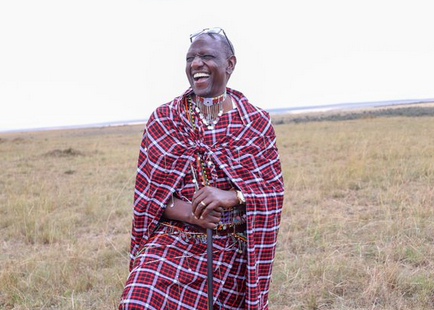

President William Ruto is expected in the Maasai Mara
Reserve on Thursday, for a high-profile visit that coincides with the
world-renowned Wildebeest Migration spectacle.
According to his itinerary, Ruto will have an exclusive
interview with China Global Television Network (CGTN).
He will also get a guided tour to witness the
migration firsthand and hold a public rally at Sekenani, one of the main entry gates
to the Mara.
The CGTN, which boasts a viewership of over 25 million
people globally, is expected to showcase Kenya’s rich wildlife heritage to a
vast international audience and boost tourism interest in the country.
This comes after the reserve was recognised as the “eighth
wonder of the world” and featured in the World Book of Records, UK, as the site
of the “World’s Greatest Annual Terrestrial Wildlife Migration”.
The World Book of Records listing honours the annual migration of more than
1.5 million wildebeests, zebras and antelopes across the Serengeti-Mara
ecosystem.
The Mara-Serengeti Migration is celebrated for its
unmatched scale, natural drama, and ecological significance.
The Great Migration, one of the planet’s most awe-inspiring natural events, draws
thousands of visitors each year and plays a significant role in maintaining
ecological balance in the region.
It is one of the largest and longest terrestrial migrations on earth, a
synchronised natural event of massive scale and danger and a display of life,
death, and survival.
From July to October, waves of wildebeest journey from Tanzania’s Serengeti
into the Maasai Mara in search of greener plains and fresh water.
Tourism Cabinet Secretary Rebecca Miano has extended an invitation to both
local and international visitors, ahead of the 2025 season, a year recognised
by the United Nations for themes including Glaciers, Peace, Trust, Quantum
Science, and Co-operatives.
Miano said 2025 holds mathematical charm, being a perfect square—45 by
45—offering, in her words, “another dimension to quad experiences” for those
who explore Kenya in this special year.
According to Asili Africa, the wildebeest migration is unmatched in scale, with over a million of them, joined by zebras, topis, and other gazelles, covering
hundreds of kilometres in an endless loop across the Serengeti-Mara ecosystem.
The journey, which begins in the Ngorongoro Conservation Area in Tanzania
and loops through the Masai Mara, is often described as one of nature’s
greatest displays.
Driven by instinct and resilience, the wildebeest brave challenging terrain, river crossings, and constant threats from animals like lions, cheetahs, leopards, hyenas, wild dogs, and crocodiles.













